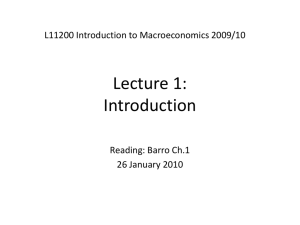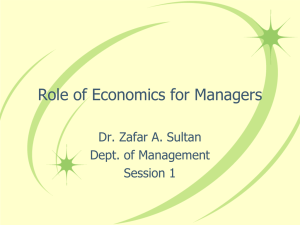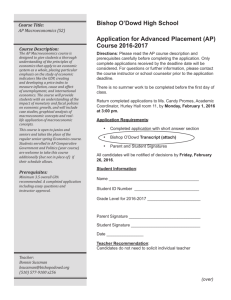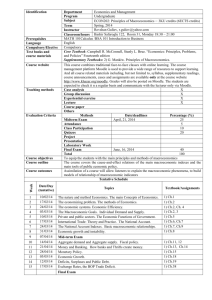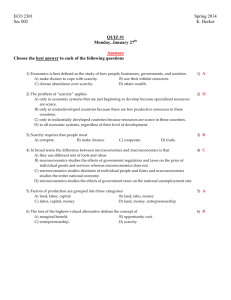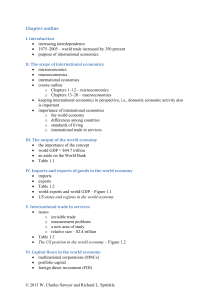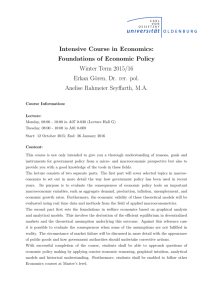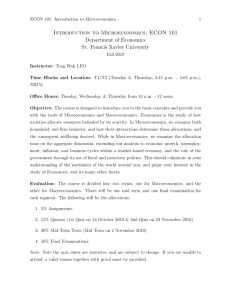CMBB 192
advertisement
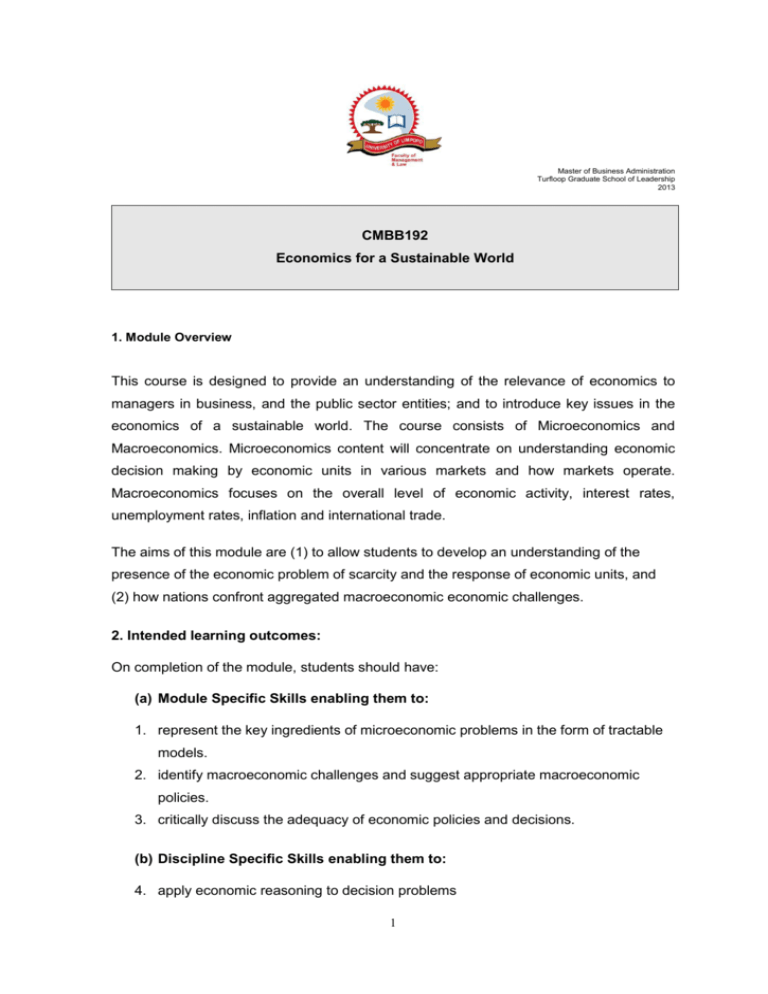
Master of Business Administration Turfloop Graduate School of Leadership 2013 CMBB192 Economics for a Sustainable World 1. Module Overview This course is designed to provide an understanding of the relevance of economics to managers in business, and the public sector entities; and to introduce key issues in the economics of a sustainable world. The course consists of Microeconomics and Macroeconomics. Microeconomics content will concentrate on understanding economic decision making by economic units in various markets and how markets operate. Macroeconomics focuses on the overall level of economic activity, interest rates, unemployment rates, inflation and international trade. The aims of this module are (1) to allow students to develop an understanding of the presence of the economic problem of scarcity and the response of economic units, and (2) how nations confront aggregated macroeconomic economic challenges. 2. Intended learning outcomes: On completion of the module, students should have: (a) Module Specific Skills enabling them to: 1. represent the key ingredients of microeconomic problems in the form of tractable models. 2. identify macroeconomic challenges and suggest appropriate macroeconomic policies. 3. critically discuss the adequacy of economic policies and decisions. (b) Discipline Specific Skills enabling them to: 4. apply economic reasoning to decision problems 1 Master of Business Administration Turfloop Graduate School of Leadership 2013 5. use economic analysis to construct explanations for observed economic actions. 6. critically reflect on current economic shocks and how they impact on the economy. (c) Personal and Key Skills enabling them to: 7. plan and manage their time effectively in relation to deadlines. 8. demonstrate effective independent study skills and analytical thinking. 9. communicate and present complex arguments in oral and written form with clarity and succinctness. 3. Learning/teaching methods: A mix of lectures and group discussions. 4. Assessment: 1. Three tests 60% 2. Individual Assignment 20% 3. Group Assignment 20% Total 100% 5. Syllabus plan: Microeconomics: 1. 2. 3. 4. 5. The economic problem, scarcity and opportunity cost. Determination of the price and output level of particular goods and services. What determines workers’ wages, interest rates, and business profits? Market structures. Why do incentives matter inside markets? Macroeconomics: 1. Measurement of the overall performance of the economy. 2. How to achieve macroeconomic goals: high growth rates, stable and low prices, full employment and external equilibrium. 3. Monetary and Fiscal policy impact on business and the public sector. 4. The impact of the foreign sector on business and the public sector. 6. Timetable and concepts/topics to be covered: 2 Master of Business Administration Turfloop Graduate School of Leadership 2013 Date Topic description July 22 (a) The economic problem, scarcity and opportunity cost; (b) Determination of the price and output level of particular goods and services. Aug 19 (a) What determines workers’ wages, interest rates, and business profits? – production and costs. (b) Market structures. (c) Why do incentives matter inside markets? (a) Measurement of the overall performance of the economy. (b) How to achieve macroeconomic goals: high growth rates, stable and low prices, full employment and external equilibrium. Sept 09 Oct 14 (a) Monetary and Fiscal policy impact on business and the public sector. (b) The impact of the foreign sector on business and the public sector. Prescribed Reading: 1. Farnham, P.G., (2010) Economics for Managers, 2nd edition. Pearson, Boston. 2. McKenzie, R.B. & Lee, D.R. (2006) Microeconomics for MBAs – The economic way of thinking for managers 2nd edition. Cambridge University Press, Cambridge. 3. Davis, M.A., (2009) Macroeconomics for MBAs and Masters of Finance, Cambridge University Press, Cambridge. 4. McConnell, C.R., Brue, S.L. & Flynn, S.M. (2009) Economics, 18th edition. McGraw-Hill, New York. Additional Recommended Reading: 1. Newspapers (Business/Economics sections) 2. SARB Quarterly bulletins 3. The Financial Mail 4. The Economist Module Leader: Kwena SM Matjekana Office No. 1032, 1st Floor, SEM Building (Old K Block) Email Address: kwena.matjekana@ul.ac.za 3 Master of Business Administration Turfloop Graduate School of Leadership 2013 Telephone No.: +2715 268 2635/8 4

